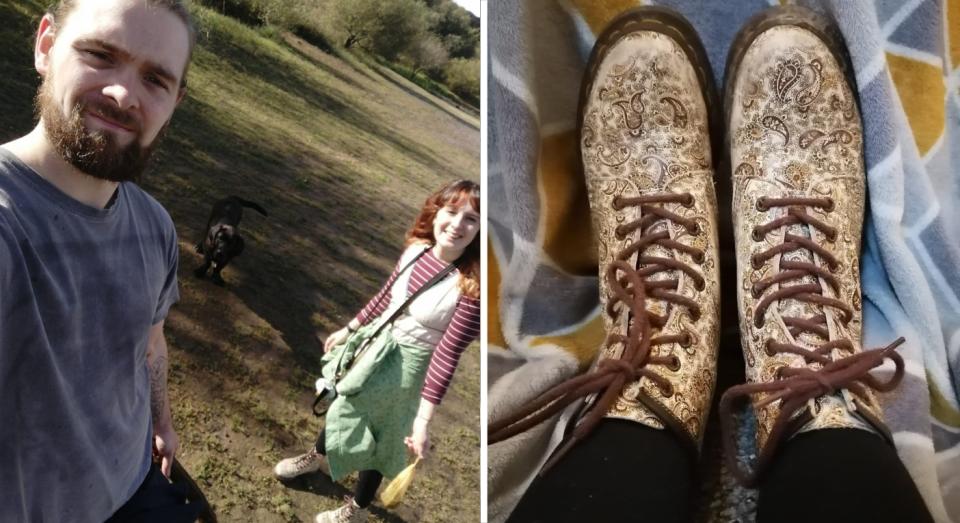‘Why I buy all of my clothes second hand’

The fast fashion industry, while cheap, can be ethically questionable. Which is why Charlotte Bray has vowed to never buy new clothes again and will only shop at second-hand stores.
The 22-year-old waitress began to shop at thrift stores when she was 15, but it became a political statement for her two years ago when she became concerned by estimates that £140 million worth of clothing was going to landfill each year.
“The best thing is finding pieces that would be really expensive new and getting them for a bargain price,” Bray says.
“I like the fact you’re giving money to the charity or a small second hand business rather than a big corporation too. I’d never go back to shopping in the fast fashion chain stores now.”
Read more: How this shopper batch cooks two weeks' worth of dinners for just £5
Bray, from Halifax, West Yorkshire, devotes her spare time to scouring charity shops for dresses, cardigans or hunting online – where she managed to pick up a second hand Henry Holland dress for just £5.50.
“I started using charity shops when I was 15 and was paying for my own clothes. They’re great, as I wanted nice clothes but I couldn’t afford them new,” Bray explains.
“But a couple of years ago I started to read more about fast fashion, how much shops throw out and what ends up in landfill. I’d also become vegan so I was becoming more socially and environmentally conscious.”

Now, Bray uses websites like eBay, Depop and Facebook swap groups to pick up high quality clothes and shoes.
“I spend a lot of time on eBay, especially during lockdown, because there is so much stuff on there that is really good quality,” she says.
“There are a lot of smaller businesses on the website, too, who I would rather give my money to.”
Her weekends will often be spent going from charity shop to charity shop trying to find something unique.
“We have the best charity shops in Halifax. There’s an Oxfam where everything is £1.99. You can’t believe what you’re getting for that price,” she adds.
“Especially before lockdown, I’d spend the weekends rummaging through charity and vintage shops. That for me is a weekend well spent! People ask me how I have the time to go through and find things like this, but I think it’s the same as rummaging through places like TK-Maxx.”
Read more: Bride rearranges whole wedding in one day to get married before new lockdown
Bray adds that finding a gem “takes some patience” but the best bit is when you “find something completely unexpected”.
“There’s not much that costs more than £5, so I save a fortune,” she says. “The only thing I buy new is underwear and socks – which I’ll get from an ethical clothing brand.
“I’ll even buy pyjamas from a charity shop. The clothes are steamed by people who work there, and I will wash them before I wear them. It makes no difference to me.”
One of her favourite finds was actually by her boyfriend, Dan Durrance, who picked up a pair of Dr. Martens for Bray as a Christmas present for just £45. The staple boot can cost over £100 new.

“Another of my favourites is a paisley print top which I bought from a charity shop for £2 years ago and a purple jumper I bought six years ago for £2.50, which is of really good quality.” Bray continues.
“Recently I’ve picked up some really unique vintage style dresses on eBay including a Henry Holland one for £5.50 and a Cath Kidston for £9. I got a Run and Fly cardigan with foxes on it for £1.99 which would have been £29 new, Campbell soup design converse for £12 and Orla Kiely shoes for £20, Levi shorts for £5, and a Joules coat for £35.”
Read more: 'How I saved £15,000 to buy a house in just two and a half years'
Bray describes her thrifty shopping as a “lifestyle for me and I would never go back”. She adds that it has been particularly handy to save money during the pandemic.
“For me and my boyfriend working in hospitality it has been an uncertain time, and we don’t know what’s going to happen so shopping this way has also been good for my finances,” she says.
“There are a lot of people in the same boat so, hopefully, they can see the appeal of shopping second hand.”
Watch: Is working from home affecting our mental health?



